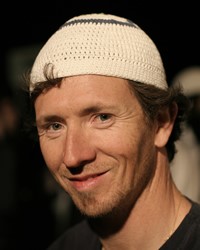Jewish, Eastern Yiddish-speaking in Israel

Photo Source:
Copyrighted © 2026
paul prescott - Shutterstock All rights reserved. Used with permission |
Send Joshua Project a map of this people group.
|
| People Name: | Jewish, Eastern Yiddish-speaking |
| Country: | Israel |
| 10/40 Window: | Yes |
| Population: | 195,000 |
| World Population: | 808,900 |
| Primary Language: | Yiddish, Eastern |
| Primary Religion: | Ethnic Religions |
| Christian Adherents: | 0.00 % |
| Evangelicals: | 0.00 % |
| Scripture: | Complete Bible |
| Ministry Resources: | Yes |
| Jesus Film: | Yes |
| Audio Recordings: | Yes |
| People Cluster: | Jewish |
| Affinity Bloc: | Jewish |
| Progress Level: |
|
Introduction / History
Since the 1400s, there have been Yiddish speakers in what is now Israel. At the time, it was part of the Ottoman Empire. 1700 saw a large influx of Yiddish speakers from Poland.
A new stream of immigrants into Israel began in the 1880s with the national and cultural revival known as "Zionism." The trickle of immigrants became a flood when the nation of Israel was established in 1948. A high percentage of these Jewish settlers were Yiddish speakers. There was a time when it wasn t clear if Yiddish or Hebrew would be the official language of the new Jewish state. Hebrew won out, and for a while, Yiddish was banned from periodicals and theater. The Yiddish language is a German dialect with Hebrew and Slavic elements.
What Are Their Lives Like?
Extended families are very important to Yiddish-speaking Jewish people. They come together for a Jewish feast as an extended family. Members of extended families come together for weddings, which usually involve around 300 people.
Israel s countryside is dotted with villages and towns. The original kibbutzim are evolving into villages. Rural Yiddish-speaking Jewish farmers utilize modern farming machinery and irrigation techniques, enhancing their farms' productivity.
Israel is highly urbanized and has a strong tech industry. A large percentage of the population holds white-collar jobs. This small country has the 26th largest GNP of any nation. Israel maintains three educational systems for Jewish children, where they are prepared to compete in a modern urban economy while learning the fundamentals of Judaism and the Torah.
What Are Their Beliefs?
Though they are diverse in their adherence to Jewish doctrine, the Israeli Jewish people are committed to the rebuilding of the Temple. Many attend local synagogues for prayer, worship and to study the word of God. But nothing can replace the Temple in their hearts and minds. They go so far as to believe that any generation that is not committed to rebuilding the Temple is guilty of its destruction. Even secularized Jewish people yearn for the Temple to be rebuilt, though their motivation is for secular reasons rather than religious ones.
Judaism is roughly divided into three streams.
Almost half are Hilonim, secularized Jews. Their identity is in the nation-state of Israel, not in the Jewish religious system. They participate in Jewish rituals such as the Passover Seder and lighting Hanukkah candles because these reinforce their identity as being Israeli and culturally Jewish. They usually oppose shutting down businesses and public transportation on the Sabbath.
The Datiim are religiously devout Jewish people who believe in the God of the Bible and usually attend Jewish religious services. Unlike the most fundamental Jewish people, they want to travel the world, produce productive businesses, and get involved with politics and the military. They will not ride public transportation on the Sabbath or open their businesses for religious reasons.
The Haredim are the most religiously devout of any Israeli Jewish group. Their close friends are all within the Haredim community, and they will not marry outside their group. They are noted for being secluded from the rest of society. They dress far more conservatively than other Jewish groups. Haredim men usually attend religious institutions. There is an ongoing controversy about their exemption from military service. They have their doubts about the legitimacy of Israel as a nation-state because they believe the Messiah has not yet come to establish Israel.
They are committed to the rebuilding of the Temple. Many attend local synagogues for prayer, worship and to study the word of God. But nothing can replace the Temple in their hearts and minds. They go so far as to believe that any generation that is not committed to rebuilding the Temple is guilty of its destruction.
What Are Their Needs?
Jewish people are in Israel largely because they need their own nation for protection. For hundreds of years, they dealt with severe persecution in Russia, Germany, Spain, and, to a lesser extent, other parts of Europe and Latin America. Their persecutors often used Christianity as an excuse to mistreat them. For this reason, most Jewish people want nothing to do with Christianity or Christ's followers. This is a major impediment to spreading the gospel.
Prayer Points
Pray the 21st century will be a harvest time for Yiddish-speaking Jewish people in Israel.
Pray for Yiddish-speaking Israelis to rise above traditions and seek their Messiah in truth.
Pray that good fruit will come from efforts by Christ's followers to reach out to them.